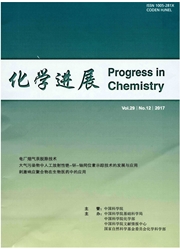

 中文摘要:
中文摘要:
与碳链聚合物相比,聚氨基酸类高分子由于其生物相容性好、可降解代谢、毒副作用低等优点而被广泛应用于生物医药领域。基于天冬氨酸的聚天冬酰胺衍生物,其合成方法简单多样,通过对其修饰改性可制备出具有各种环境响应性(温度、p H和还原敏感)的智能高分子,得到高效、低毒的药物/基因载体,实现可控释放、增强疗效、降低药物副作用的目的。本文重点介绍了聚天冬酰胺衍生物(特别是刺激响应性聚天冬酰胺衍生物)的合成改性方法、及其在药物和基因载体领域最新的研究进展,并对其发展前景进行了展望。
 英文摘要:
英文摘要:
Compared with carbon-chain polymers, poly (amino acid)s have attracted much attentions in biomedical and pharmaceutical fields because of their good biocompatibility, biodegradability and nontoxicity. Polyaspartamide derivatives based on L-aspartic acid not only can be easily synthesized, but also can be further modified with various structures to prepare intelligent material with different stimuli-responsivity (such as temperature, pH and redox), resulting in controlled release, enhancement of therapeutic effects and reduction of the drug side effects. In this review, the different synthetic strategies for preparing polyaspartamide derivatives and the up-to-date developments on polyaspartamide derivatives for drug and gene delivery systems are summarized. Besides, the future perspectives of polyaspartamide derivatives are discussed.
 同期刊论文项目
同期刊论文项目
 同项目期刊论文
同项目期刊论文
 Synthesis and Characterization of Biodegradable Amphiphilic ABC Y-Shaped Miktoarm Terpolymer by Clic
Synthesis and Characterization of Biodegradable Amphiphilic ABC Y-Shaped Miktoarm Terpolymer by Clic 期刊信息
期刊信息
